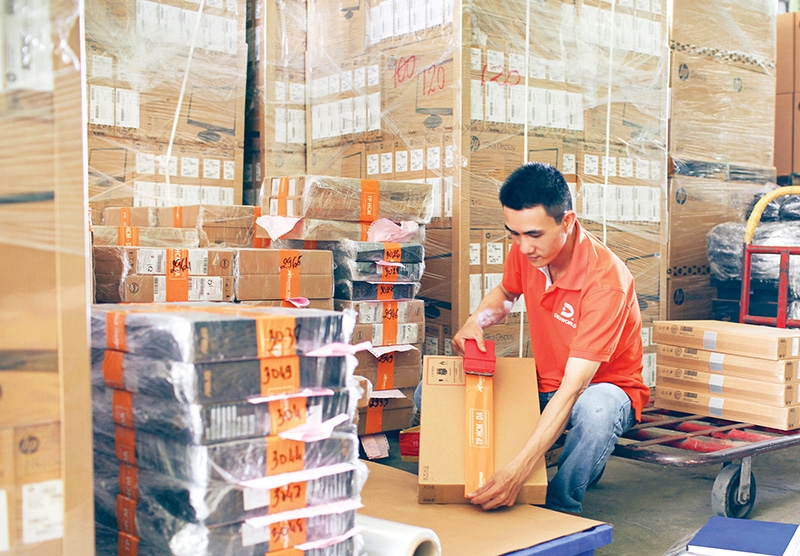Digiworld unable to grasp market
 |
| Amid strong competition, Digiworld is unlikely to take the lead even with its Apple deal, Photo Le Toan |
Along with Mobile World and FPT Retail, Digiworld became an official distributor of US tech titan Apple through a strategic partnership in late June. Through the deal, Digiworld is responsible for distributing authentic Apple products including iPhone, iPad, MacBook, Beats, Watch, and more.
The cooperation between the two sides took place with the retailer being left behind by Mobile World and FPT Retail – companies that have taken the majority of the market with thousands of outlets across the country. So far, Digiworld’s mobile retail market share is about 8 per cent, while those of Mobile World and FPT Retail are 45 and 18 per cent, respectively. Mobile World is expecting to raise the ratio to around 50 per cent this year.
The new deal with Apple was expected to enhance the reputation of Digiworld. However, its stock price (HSX: DGW) has declined after an increase in June when it climbed 8.29 per cent to VND42,600 ($1.85) on the heels of the Apple partnership announcement.
According to an assessment from SSI Securities Corporation, despite positive prospects reflected by annual growth in revenue and profits, Digiworld’s partner network with new brands is still inferior compared to its competitors.
Digiworld only works with five smartphone manufacturers, with HTC and Nokia losing their grip to Apple and Samsung many years ago. Meanwhile, Mobile World and FPT Retail have entered into cooperation with dozens of smartphone brands, partially facilitating their dominance of the market.
Moreover, according to market analysts, with the local demand for smartphones and technology devices reaching the saturation point, it seems the alliance with the iPhone maker is unlikely to create any real breakthrough for Digiworld.
Germany-based market research company GfK noted that in the first quarter of 2020, the total revenue of the Vietnamese tech device market curtailed by 4.2 per cent on-year to VND56.7 trillion ($2.46 billion). Last year, the market only grew a single percentage point as it forecasted in 2018.
On the other hand, Digiworld suffers in commparison to its two arch-rivals even in Apple product distribution as the other two hold nearly 80 per cent of total authentic Apple sales.
According to an unofficial source, Apple last year reached about $1 billion in revenue in the country. Thus, Mobile World and FPT Retail could earn about $800 million from trading these products.
In response to VIR, a representative of Mobile World said that Apple products account for nearly one-fifth of its total sales. Meanwhile, more than one-third of FPT Retail sales came from the products, following its latest financial report.
Consequently, Digiworld’s chances to dominate the segment are miniscule. The retailer declined to reveal the specific estimated contribution of sales of Apple products, only mentioning “positive prospects” following information published at its recent shareholders’ meeting.
Indeed, before Digiworld, many local companies such as Imex Pan Pacific (IPP), iShop Vietnam Co., Ltd., and FPT entered into partnerships with Apple to sell authentic goods through Apple Premium Reseller (APR) stores. Most recently, Petrosetco set foot in the list of Apple product distributors in the nation and iShop Vietnam failed within a few years. Meanwhile, eDiGi (IPP’s APR store) has remained silent since its launch in 2018, and FPT Retail – which runs 14 APR stores named F.Studio – is planning to steadily lower the number of outlets, partially fuelled by the saturation.
In April alone, FPT Retail closed 170 stores, equalling one-third of its stores across the country.
Through constant tie-ups with local partners and building up some manufacturing facilities in Vietnam, Apple is targeting to penetrate the market, which is considered the second-largest smartphone market in Southeast Asia following Indonesia, according to a report by GfK.
It also shows that Apple is not satisfied with business results from the Vietnamese market, although in the first four months of this year, the brand accounted for the third-largest market share in Vietnam and second in terms of value, according to GfK. To explore this great potential, Apple is unlikely to depend on only two or three distributors.
However, the deeper reason for this move is to look for locations for its supply chains outside China, and Vietnam is a consideration.
Although there is no official confirmation that Apple will select Vietnam as the place to manufacture and assemble iPhones and iPads, the consecutive expansion of a series of its suppliers such as Luxshares Vietnam and Foxconn are examples to reinforce the forecast.
What the stars mean:
★ Poor ★ ★ Promising ★★★ Good ★★★★ Very good ★★★★★ Exceptional
 Tag:
Tag:
Related Contents
Latest News
More News
- Japanese business outlook in Vietnam turns more optimistic (January 28, 2026 | 09:54)
- Foreign leaders extend congratulations to Party General Secretary To Lam (January 25, 2026 | 10:01)
- 14th National Party Congress wraps up with success (January 25, 2026 | 09:49)
- Congratulations from VFF Central Committee's int’l partners to 14th National Party Congress (January 25, 2026 | 09:46)
- 14th Party Central Committee unanimously elects To Lam as General Secretary (January 23, 2026 | 16:22)
- Worldwide congratulations underscore confidence in Vietnam’s 14th Party Congress (January 23, 2026 | 09:02)
- Political parties, organisations, int’l friends send congratulations to 14th National Party Congress (January 22, 2026 | 09:33)
- Press release on second working day of 14th National Party Congress (January 22, 2026 | 09:19)
- 14th National Party Congress: Japanese media highlight Vietnam’s growth targets (January 21, 2026 | 09:46)
- 14th National Party Congress: Driving force for Vietnam to continue renewal, innovation, breakthroughs (January 21, 2026 | 09:42)






















 Mobile Version
Mobile Version